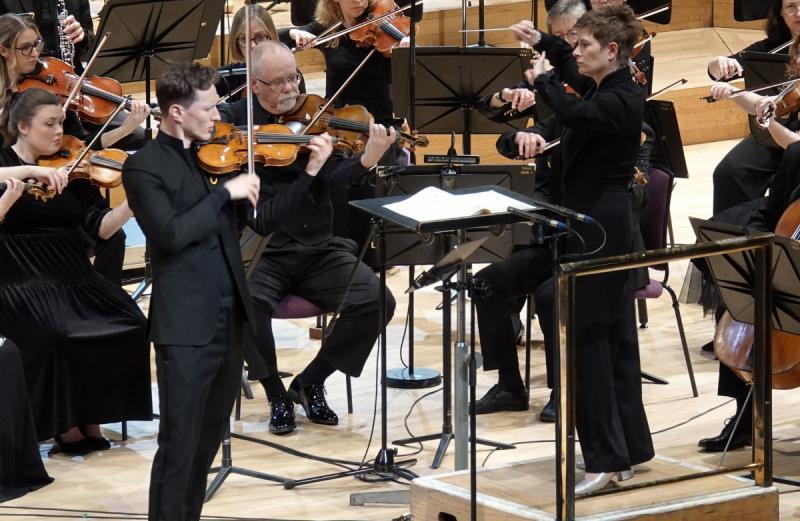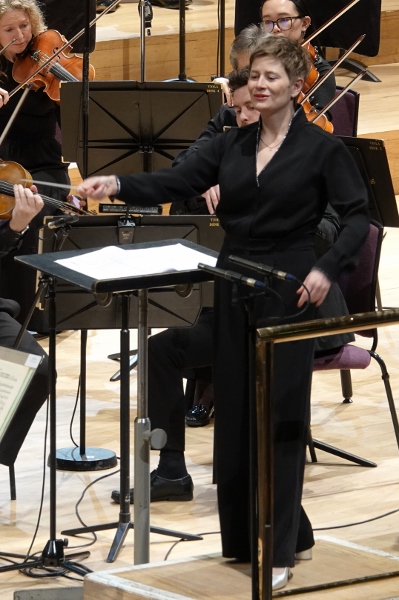Špaček, BBC Philharmonic, Bihlmaier, Bridgewater Hall, Manchester review - three flavours of Vienna | reviews, news & interviews
Špaček, BBC Philharmonic, Bihlmaier, Bridgewater Hall, Manchester review - three flavours of Vienna
Špaček, BBC Philharmonic, Bihlmaier, Bridgewater Hall, Manchester review - three flavours of Vienna
Close attention, careful balancing, flowing phrasing and clear contrast

Billed as a “Viennese Whirl”, this programme showed that there are different kinds of music that may be known to the orchestral canon as coming from Vienna.
For a start, there’s the classical tradition of Mozart, Beethoven and those who aimed to be their successors. Then there are the 19th century dance creations and operettas of Johann Strauss II and his contemporaries. And there’s also the “Second Viennese School” … and conductor Anja Bihlmaier (pictured below) offered all three.
The last was represented by Berg’s Violin Concerto, probably the most endearing and enduring of works written using 12-tone technique – and in fact so imbued with a sense of tragedy arising from the death of Alma Mahler’s young daughter (with Walter Gropius, her other famous husband) in 1935, and written with a freedom that includes some remarkably traditional tonal harmonic effects and quotes an entire Bach chorale setting, that it appeals in a way that few others of that genre do.
 Josef Špaček was the soloist with the BBC Philharmonic, in a performance that was marked by soulfully lyrical expression and an approach from him and the orchestra that made every phrase sing. There’s an almost post-Mahlerian use of solo orchestral wind instruments in chamber music style that gave them scope to shine, but the big points of drama were there in abundance too. The ending of the work was gentle and elegiac, after the deconstructions that preceded it (tellingly emphasised by Bihlmaier) – bringing the trajectory to a sense of acceptance after it had plumbed the depths of shock and anger.
Josef Špaček was the soloist with the BBC Philharmonic, in a performance that was marked by soulfully lyrical expression and an approach from him and the orchestra that made every phrase sing. There’s an almost post-Mahlerian use of solo orchestral wind instruments in chamber music style that gave them scope to shine, but the big points of drama were there in abundance too. The ending of the work was gentle and elegiac, after the deconstructions that preceded it (tellingly emphasised by Bihlmaier) – bringing the trajectory to a sense of acceptance after it had plumbed the depths of shock and anger.
The earlier Viennese symphonic tradition was represented by Beethoven’s Seventh Symphony, in a performance with the same string forces (led by Zoe Beyers) that were used for the “Emperor” Piano Concerto when Bihlmaier was with the Philharmonic a few weeks ago: totalling 40, in the usual proportions plus a fifth double bass to give extra bite to the bass lines. It works extremely well, making for a lean, clean sound that’s capable of very small effects as well as big impacts.
Bihlmaier takes an approach to this music that’s one of close attention, careful balancing of voices and shaping of phrases, with a flowing and graceful style and plenty of light and dark contrast. The first movement was segue’d straight into the Allegretto, where there was solemnity from the rhythmic tread of the bass line despite a mobile pace, and strings’ precise articulation in the fughetta was admirable. The Scherzo was unhurried though skipping along without hesitation, and the phrases of the Trio were eloquently drawn. And the finale was pounding and relentless, but still delightfully balanced and clear.
And the Strauss ingredient? Each half of the concert began with a classic waltz concoction: the Emperor to open, and On the Beautiful Blue Danube after the interval. These were with the full symphonic strength of the Philharmonic, played with a combination of nostalgic sweetness and sumptuous tone – even, at times, near-Brucknerian brass resonance. Each phrase was carefully enunciated, the violins occasionally giving repeated downbows for emphasis.
The codas were drawn with a touch of sentiment, acknowledging in the one case the sense of time passing as the bewhiskered old inhabitant of the Schönbrunn palace measured out his days, and the awareness of a glory that was all too soon to be departed from a great empire in the other: just a little portamento can say a great deal.
- To be broadcast on Radio 3 on 5 June
- More classical reviews on theartsdesk
rating
Explore topics
Share this article
The future of Arts Journalism
You can stop theartsdesk.com closing!
We urgently need financing to survive. Our fundraising drive has thus far raised £49,000 but we need to reach £100,000 or we will be forced to close. Please contribute here: https://gofund.me/c3f6033d
And if you can forward this information to anyone who might assist, we’d be grateful.

Subscribe to theartsdesk.com
Thank you for continuing to read our work on theartsdesk.com. For unlimited access to every article in its entirety, including our archive of more than 15,000 pieces, we're asking for £5 per month or £40 per year. We feel it's a very good deal, and hope you do too.
To take a subscription now simply click here.
And if you're looking for that extra gift for a friend or family member, why not treat them to a theartsdesk.com gift subscription?
more Classical music
 Bizet in 150th anniversary year: rich and rare French offerings from Palazzetto Bru Zane
Specialists in French romantic music unveil a treasure trove both live and on disc
Bizet in 150th anniversary year: rich and rare French offerings from Palazzetto Bru Zane
Specialists in French romantic music unveil a treasure trove both live and on disc
 Scottish Chamber Orchestra, Ibragimova, Queen’s Hall, Edinburgh review - rarities, novelties and drumrolls
A pity the SCO didn't pick a better showcase for a shining guest artist
Scottish Chamber Orchestra, Ibragimova, Queen’s Hall, Edinburgh review - rarities, novelties and drumrolls
A pity the SCO didn't pick a better showcase for a shining guest artist
 Kilsby, Parkes, Sinfonia of London, Wilson, Barbican review - string things zing and sing in expert hands
British masterpieces for strings plus other-worldly tenor and horn - and a muscular rarity
Kilsby, Parkes, Sinfonia of London, Wilson, Barbican review - string things zing and sing in expert hands
British masterpieces for strings plus other-worldly tenor and horn - and a muscular rarity
 From Historical to Hip-Hop, Classically Black Music Festival, Kings Place review - a cluster of impressive stars for the future
From quasi-Mozartian elegance to the gritty humour of a kitchen inspection
From Historical to Hip-Hop, Classically Black Music Festival, Kings Place review - a cluster of impressive stars for the future
From quasi-Mozartian elegance to the gritty humour of a kitchen inspection
 Shibe, LSO, Adès, Barbican review - gaudy and glorious new music alongside serene Sibelius
Adès’s passion makes persuasive case for the music he loves, both new and old
Shibe, LSO, Adès, Barbican review - gaudy and glorious new music alongside serene Sibelius
Adès’s passion makes persuasive case for the music he loves, both new and old
 Anja Mittermüller, Richard Fu, Wigmore Hall review - a glorious hall debut
The Austrian mezzo shines - at the age of 22
Anja Mittermüller, Richard Fu, Wigmore Hall review - a glorious hall debut
The Austrian mezzo shines - at the age of 22
 First Person: clarinettist Oliver Pashley on the new horizons of The Hermes Experiment's latest album
Compositions by members of this unusual quartet feature for the first time
First Person: clarinettist Oliver Pashley on the new horizons of The Hermes Experiment's latest album
Compositions by members of this unusual quartet feature for the first time
 Gesualdo Passione, Les Arts Florissants, Amala Dior Company, Barbican review - inspired collaboration excavates the music's humanity
At times it was like watching an anarchic religious procession
Gesualdo Passione, Les Arts Florissants, Amala Dior Company, Barbican review - inspired collaboration excavates the music's humanity
At times it was like watching an anarchic religious procession
 Classical CDs: Camels, concrete and cabaret
An influential American composer's 90th birthday box, plus British piano concertos and a father-and-son duo
Classical CDs: Camels, concrete and cabaret
An influential American composer's 90th birthday box, plus British piano concertos and a father-and-son duo
 Cockerham, Manchester Camerata, Sheen, Martin Harris Centre, Manchester review - re-enacting the dawn of modernism
Two UK premieres added to three miniatures from a seminal event of January 1914
Cockerham, Manchester Camerata, Sheen, Martin Harris Centre, Manchester review - re-enacting the dawn of modernism
Two UK premieres added to three miniatures from a seminal event of January 1914
 Kempf, Brno Philharmonic, Davies, Bridgewater Hall, Manchester review - European tradition meets American jazz
Bouncing Czechs enjoy their Gershwin and Brubeck alongside Janáček and Dvořák
Kempf, Brno Philharmonic, Davies, Bridgewater Hall, Manchester review - European tradition meets American jazz
Bouncing Czechs enjoy their Gershwin and Brubeck alongside Janáček and Dvořák
 Solomon, OAE, Butt, QEH review - daft Biblical whitewashing with great choruses
Even a top soprano and mezzo can’t make this Handel paean wholly convincing
Solomon, OAE, Butt, QEH review - daft Biblical whitewashing with great choruses
Even a top soprano and mezzo can’t make this Handel paean wholly convincing

Add comment